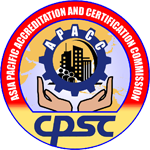Tek-Bok BUZZ/Manila Bulletin/ May 21, 2010
Asia Pacific Accreditation and Certification Commission
It is not widely known even among school administrators and training executives that there is an existing body for regional accreditation and certification of TVET institutions in the Asia Pacific region.
Known as the Asia Pacific Accreditation and Certification Commission (APACC), it aims to accredit and certify TVET institutions through the standardization and harmonization of education and training systems which facilitates the mobility of the workforce across national borders in the region.
Established by the Colombo Plan Staff College (CPSC) under 2004 Seoul Declaration, the commission’s functions include the development of accreditation criteria, recruitment and training of accreditors, establishment of linkages with national accrediting agencies, and conduct accreditation and certify the status earned by TVET institutions.
The commission, likewise, serves as the source of "good practices" for the promotion of quality in TVET systems in the region.
The ASPACC as implementing agency for accreditation is under CPSC, which is now the regional center of excellence for technical and vocational education and training.
A process and a status
Accreditation is viewed as both a process and a status. It is a process by which a TVET institution evaluates its operations and programs and seeks an independent judgment to confirm that it substantially achieves its objectives, and is generally equal in quality to comparable institutions or programs.
As a status, accreditation is a formal recognition granted by an authorized accrediting agency to an institution or program as possessing certain standards of quality as defined by the accreditation agency.
Thus, there are two prominent models of accreditation adopted around the world: program and institutional accreditation.
In the APACC scheme, institutional accreditation is preferred, covering accreditation and certification of TVET institutions of higher technical and non-degree technical education and vocational training.
The APACC accreditation is a voluntary procedure by which the commission gives formal recognition that a TEVT institution’s academic and educational quality has met the commission’s accreditation criteria. It is a continuous improvement process of the institution
and an internationally recognized sign of quality.
The Accreditation Instrument is the tool used in the evaluation of TVET institutions and training programs. The bases of evaluation are the seven criteria contained in the instrument: governance and management, teaching and learning, faculty and staff, research and development, extension, consultancy and linkages, resources, and support to students.
Each of this criterion contains more specific parameters called Indicators. The indicators are made up of one or more sub-indicators called elements.
Accreditation manual
The complete guide to accreditation is contained in two volumes- the APACC Accreditation Manual and Accreditation Instrument. The manual includes full documentation of the implementing organization, criteria of evaluation and rating procedures, preparation of requirements before on-site visit and definition of roles of accreditors.
There is also a Handbook for Accreditors which gives a detailed description of the guides and procedures intended to help the accreditors in undertaking an actual on-site visit. The guides are suggestive guidelines and not prescriptions.
In June 2006, then TESDA Director General, Secretary Augusto Boboy Syjuco and then APACC President and CPSC Director General Dr. Man-Gon Park signed an agreement for collaborative partnership in advancing the aims and objectives of the commission.


The agreement specifies joint undertakings to promote the goals and objectives of APACC as a mechanism to encourage TVET systems for HRD to undergo evaluation under the commission’s procedures and standards.
Milagros Dawa-Hernandez, TESDA Deputy Director General for Sectoral TVET, was designated by APACC as Philippine National Coordinator for Accreditation.
Center of excellence for women
The TESDA Women Center (TWC) in Taguig City and International Academy of Film and Television in Cebu, were initially chosen as pilot institutions for the APACC accreditation exercise in Philippines.
TWC is the first Philippine-based institution accredited and certified by APACC with silver level status in May 2008. Today, the TWC is an internationally-recognized center of excellence for women in the Asia-Pacific region that provides market-oriented, modern technology-based education and training, policy and action-oriented research, and pro-active advocacy in support of women's economic empowerment.
As jointly planned by APACC and TESDA, 125 TVET institutions in the Philippines are set to be accredited by commission.
As of March 2010, 11 TESDA institutions nationwide have completed their APACC accreditation procedures and have been granted accreditation status. Three institutions led
by TWC were granted silver level accreditation status and eight got bronze level status.

APACC accredited institutions and stakeholders enjoy a host of benefits including workforce mobility, employer confidence on graduates, international recognition as a quality institution, and transferability of credits earned by students and trainees.
For details on TESDA programs and services, call 887-7777, send SMS message 09174794370 (Globe) 09182738232 (Smart) or email contactcenter@tesda.gov.ph



